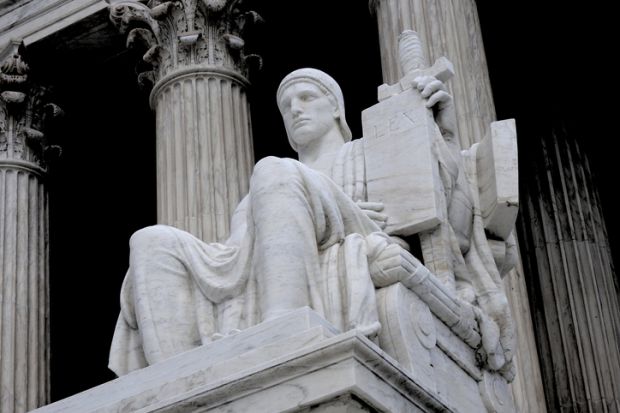Late last month, the University of North Carolina Chapel Hill’s board of trustees gathered for its first in-person meeting since the Supreme Court struck down affirmative action.
They were debating a resolution to ban the consideration of race not just in student admissions but also in hiring and contracting decisions, which many legal experts say goes beyond the scope of the ruling. Chapel Hill chancellor Kevin Guskiewicz had already said the university would comply with the court’s decision. But the board’s lawmaker-appointed members – who have butted heads with faculty and administrators in recent years over everything from a new Civic Life school to a recent tuition reduction proposal – pushed ahead to ensure their interpretation of the ruling was enforced.
The discussion stretched on for two days and was at times contentious, no doubt in part because Chapel Hill was one of the losing defendants in the case and had spent tens of millions of dollars and the better part of a decade to prevent the outcome. The trustees seemed to resent the effort spent defending affirmative action; Trustee John Preyer called it “a moment of humility”.
The resolution passed 10 to 1. The lone no vote was from Ralph Meekins, a Chapel Hill alumnus and veteran attorney who argued that the board was doing more than bringing the university into compliance with the Supreme Court decision; it was purposefully and unwisely broadening its implications.
“This resolution goes well beyond the Supreme Court ruling, and if you talk to any lawyer, they’ll tell you the same,” he told his colleagues in a last-ditch effort to persuade them to table the vote.
Others have echoed Meekins’ argument in the weeks since the ruling was passed down. The court only expressly forbade the consideration of race as a stand-alone factor in admissions, but what it left unsaid cloaks in uncertainty everything from targeted scholarships to recruitment strategies. With no clear guidance from the Department of Education, some are concerned that institutional leaders and lawmakers are jumping to broad interpretations, either out of an abundance of legal caution or as an excuse to push a hard-fought political agenda against racial diversity in higher education.
Kevin Best, Chapel Hill’s senior director of media relations, told Inside Higher Ed that the university had “nothing further to offer” on the board’s resolution and declined to answer questions about whether and how the administration would comply.
Shaun Harper, director of the University of Southern California’s Race and Equity Center, has been sounding the alarm about “interpretive overreach” since June. He believes that political actors as well as some college officials have weaponised the ruling to undermine and defund diversity efforts across higher education, and that UNC is only the tip of the iceberg.
“Race-conscious programmes, practices and policies have always been met with political opposition, and with organisational opposition, ” he said. “We shouldn’t be surprised that, now that resistors have been given a window of opportunity, they’re going to try to throw everything out through that window.”
Beyond the scope or in line with the spirit?
Many states moved swiftly to enforce broad interpretations of the Supreme Court’s ruling. Mere hours after the decision was passed down on 29 June, Missouri’s Republican attorney general, Andrew Bailey, ordered all public and private colleges and universities to immediately cease all race-conscious selection practices – “not just college admissions, but also scholarships, employment, law reviews, etc”. The University of Missouri immediately complied.
Christian Basi, Missouri’s director of media relations, told Inside Higher Ed via email that the university stood by an earlier statement on its decision to comply, adding that administrators have “stopped awarding scholarships that contain race or ethnicity as a factor” on the advice of legal counsel.
Kansas’s attorney general, Kris Kobach, applied the ruling beyond higher education, threatening the state’s private companies with “serious legal consequences” if they continued diversity hiring policies. He implied that the state government’s own contracting practices would be under close scrutiny for perceived infringements of the affirmative action ban.
While the Chapel Hill board of trustees’ resolution applied to the university’s hiring and contracting as well, Marty Kotis, a trustee who voted to approve the resolution, said that proposal dated back to March and was not connected to the Supreme Court decision.
“We paused on that because the court ruling was imminent and UNC was involved, and we didn’t want to come across as trying to influence that case,” he said.
Implicit in the interpretations of Mr Bailey, Mr Preyer and other largely right-wing authorities is the notion that affirmative action has always been unconstitutional, running against the spirit of the 14th Amendment’s equal protection clause.
Mr Kotis said some version of the UNC board resolution had been under discussion since the summer of 2021. A similar resolution on admissions lost last autumn by a vote of 11 to 2, a result Mr Kotis believes was due in part to the university’s involvement in the long-running court case brought by Students for Fair Admissions that eventually found its way to the Supreme Court. He said last month’s vote was merely the end result of a long fight to ensure non-discrimination across university operations.
“We understand [the Supreme Court ruling] is just about admissions. But the underlying law is referring back to equal protection,” Mr Kotis said. “We felt you should apply this concept – not the case, but the concept – of equal protection…not only to admissions, but hiring and contracting. Just because a case hasn’t happened yet doesn’t mean there won’t be one.”
‘Ammunition’ in the war for higher education
Mr Meekins, the lone dissenting Chapel Hill trustee, told Inside Higher Ed that he believes the board took an activist rather than a prudent stance. He had urged the board to confer with the university’s legal counsel before holding a vote, a request that his fellow board members denied. If there were legal concerns beyond admissions, he said, those were merely projections for future rulings – not a matter for the board to decide.
“Looking at the make-up of the Supreme Court, things very well may continue in that trajectory. But we don’t need to beat them to the punch,” he said. “I felt like we shouldn’t be doing anything so soon, that it was time just to reflect and look for ways that we could legally continue to have a diverse campus. We didn’t need to take a position on it.”
Mr Kotis took a different view of the board’s vote.
“I felt it was the right thing to do,” he said. “I believe board members should sometimes trust their own opinions, not necessarily university lawyers.”
Mr Meekins said that in taking steps beyond the court’s explicit requirements, Chapel Hill has once again waded into a legal minefield, potentially exposing itself to further challenges. He declined to name what those challenges might be but mentioned the inclusion of a specific quote from Chief Justice John Roberts’ majority decision: that the university must not adopt “proxies premised upon race-based preferences in hiring or admissions”, such as supplemental essays.
“That section bothered me,” he said. “I’m concerned that this resolution is some indictment of how we anticipate [the university] might try to continue to make our campus diverse, and I have more faith in our admissions process and our administrators and faculty than that.”
Mr Kotis said the board has no specific plans to address further potential implications of the Supreme Court’s decision, such as scholarships or recruitment programmes – “we’re still trying to sort those things out”, he said. But he does hope to use the board’s Audit, Compliance and Risk Management Committee, which he chairs, to “enforce non-discrimination” in the university’s admissions and hiring decisions.
James Murphy, deputy director of higher education policy for Education Reform Now, said that, in the absence of federal guidance – which the Department of Education has promised is forthcoming – the doorway for “malicious political actors” to take advantage of the ruling is wide open. Along with governors, lawmakers and attorneys general, Murphy said he was most worried about governing boards.
“I’m terrified of what Florida and Texas are going to do with this decision,” he said. “I understand the perspective of the Biden administration; it’s their job to be careful and cautious. At the same time, Republicans never seem to hesitate on these things. We need strong guidance to make sure things don’t go wrong, where you’ve got boards and governors saying, ‘Now it’s all off the table’.”
Legislators in other states have made explicitly political attempts to extend the Supreme Court ruling beyond admissions, some of which have yet to come to fruition.
Wisconsin state assembly speaker Robin Vos has publicly mulled introducing a law to review the state’s public grants and scholarships, promising to eliminate those that are race-specific. And Ohio attorney general Dave Yost warned employees of public universities that they would be personally liable in any lawsuits alleging violations of the affirmative action ban.
Professor Harper said the affirmative action ban is effectively “ammunition” for right-wing partisans in the intensifying national political battle over diversity in higher education.
“They’re weaponising this decision to use as a scare tactic against institutions, to intimidate and bully them into going beyond the decision,” Professor Harper said. “And students of colour, low-income students of colour and black students across all socio-economic backgrounds are going to be the ones devastated by this.”
Mr Meekins believes the Chapel Hill board’s response to the Supreme Court ruling should be bigger than politics, aimed at assuring campus constituents that the university’s efforts to ensure diversity will continue lawfully, and officials will “calmly and thoughtfully” assess the scope of the decision.
“Let’s let our legal team, our faculty and administrators take a second to figure it all out, because right now there’s so many different mixed messages out there and they’re already working their tails off trying to understand it,” he said. “Our audience should be our school and our students. I couldn’t give a hoot what either Fox or CNN has to say about what we do.”
“Unfortunately,” he said, “not everyone thinks that way.”
This is an edited version of a story that first appeared on Inside Higher Ed.
Register to continue
Why register?
- Registration is free and only takes a moment
- Once registered, you can read 3 articles a month
- Sign up for our newsletter
Subscribe
Or subscribe for unlimited access to:
- Unlimited access to news, views, insights & reviews
- Digital editions
- Digital access to THE’s university and college rankings analysis
Already registered or a current subscriber?








